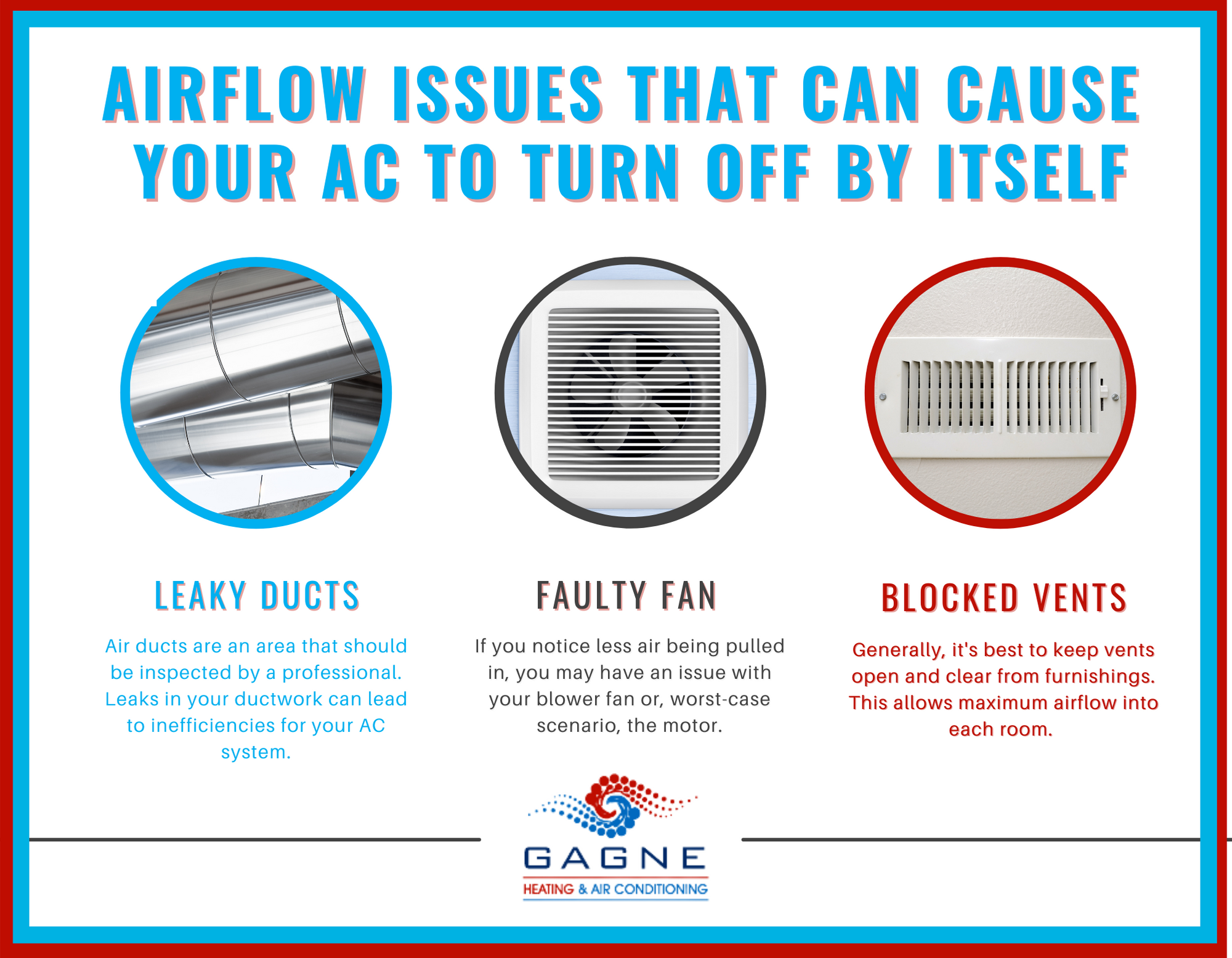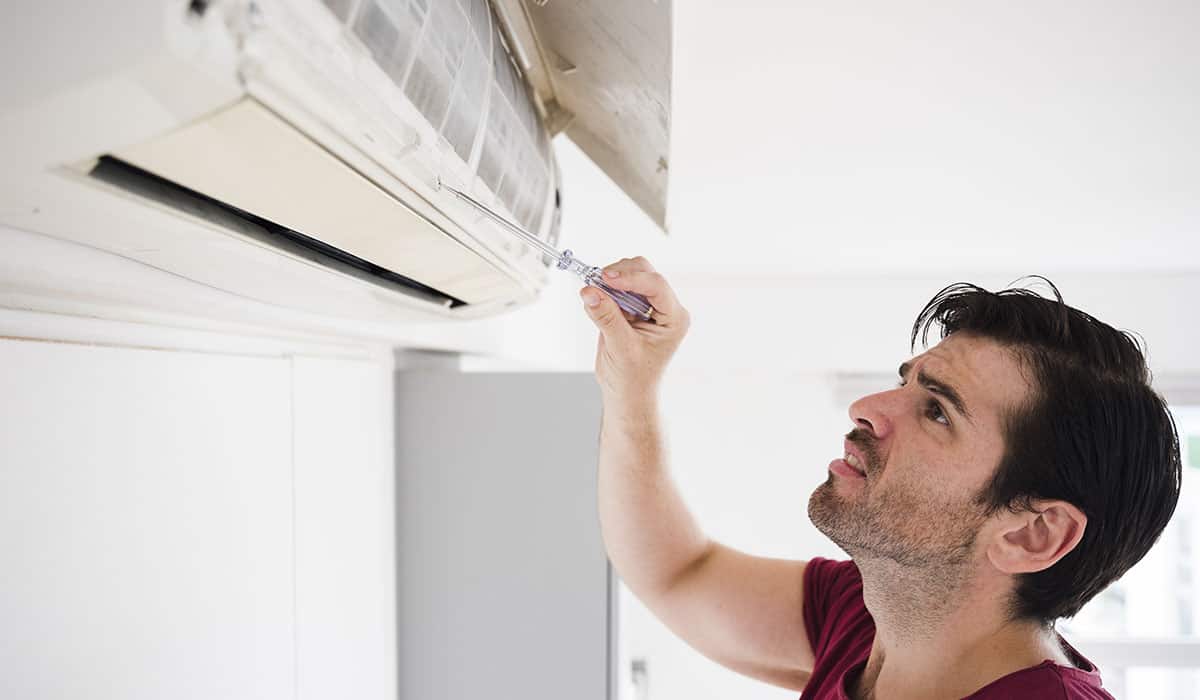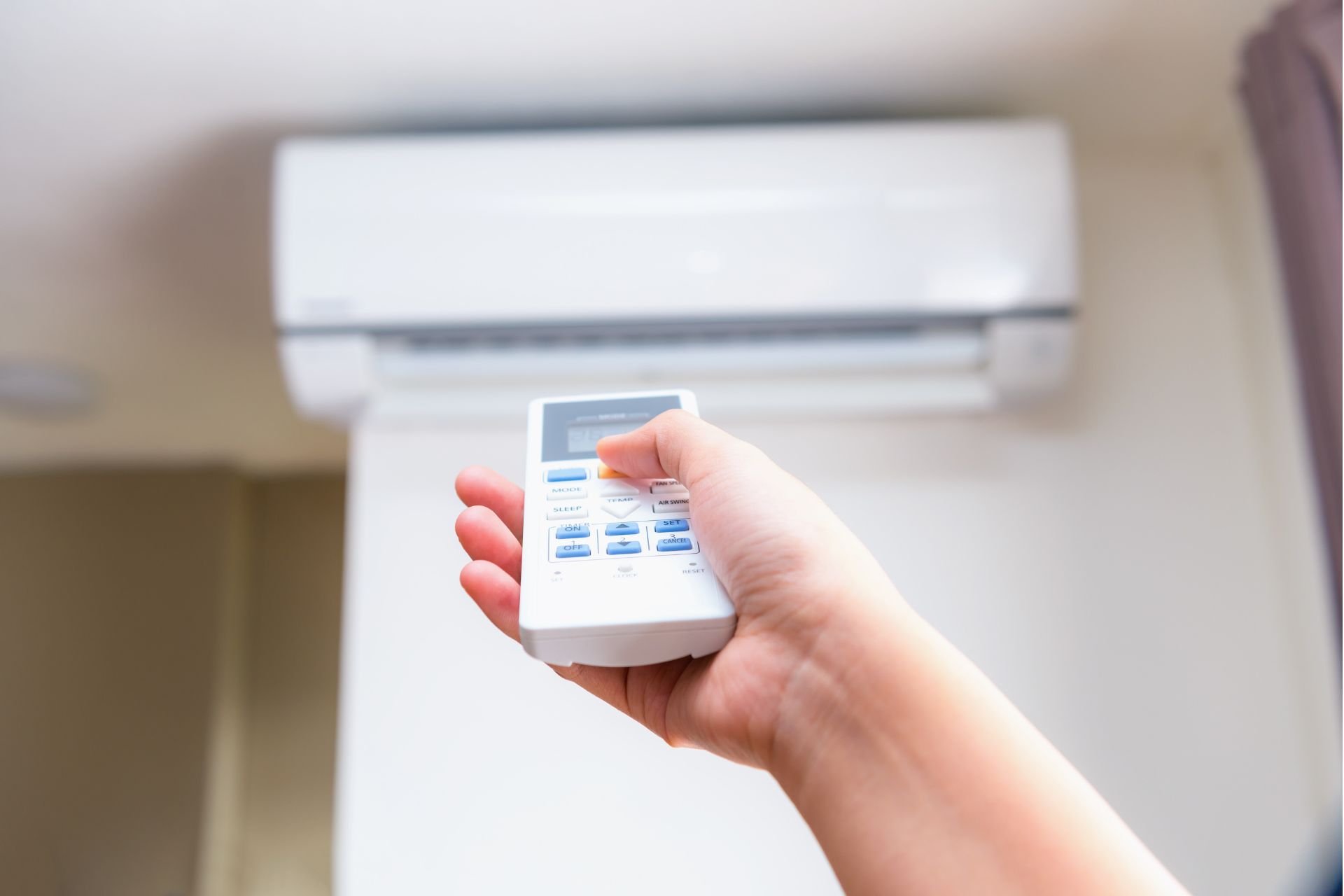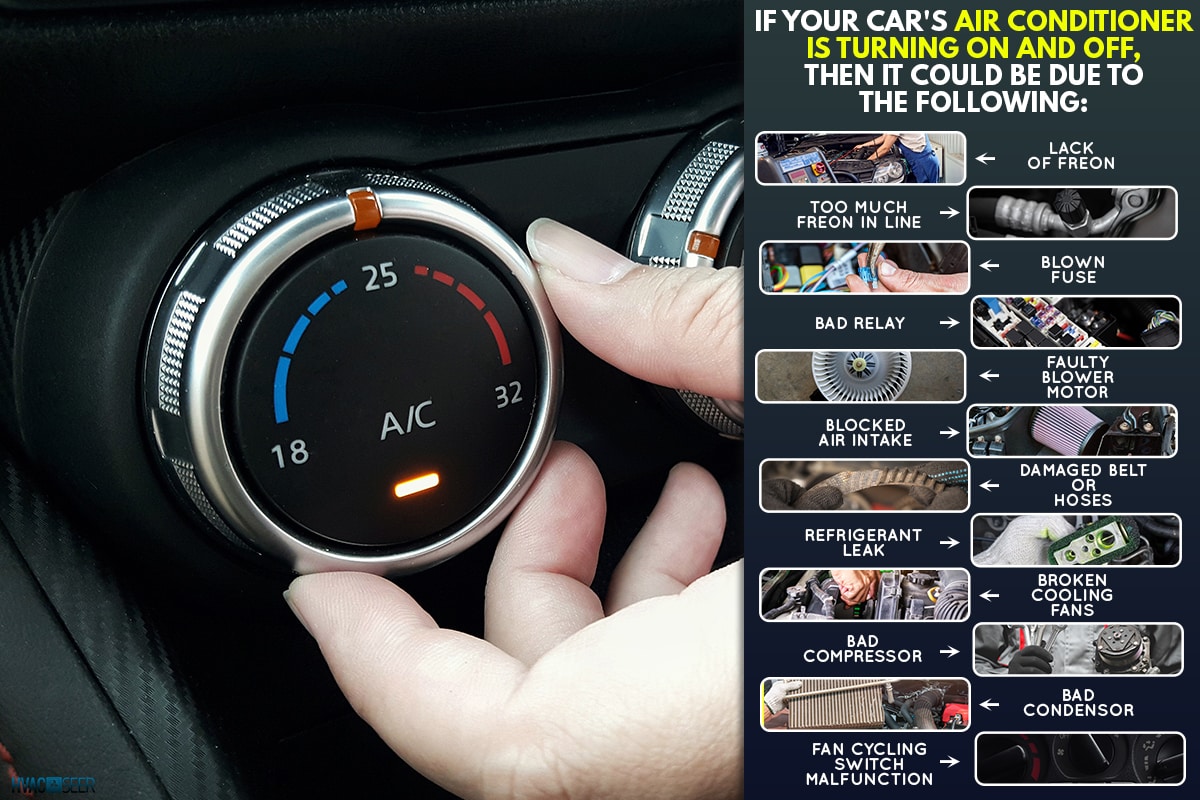Why My Ac Automatically Turns Off And On

Experiencing your air conditioner turning on and off frequently, a phenomenon known as short cycling, can be frustrating and a sign of underlying problems. This article explains the common reasons why your AC might be exhibiting this behavior and what steps you can take to address it. Understanding the root cause is the first step towards restoring your AC's efficient and consistent cooling.
Refrigerant Issues: The Lifeblood of Your AC
Think of refrigerant as the 'blood' of your AC system, carrying heat from inside your home to the outside. When levels are off, your AC's ability to cool is greatly diminished, which leads to short cycling. Both low refrigerant and overcharged refrigerant can cause this issue. It's best to consult an HVAC professional in either instance.
Low Refrigerant: A Sign of a Leak
Low refrigerant is almost always caused by a leak somewhere in the system. As the refrigerant level drops, the AC unit has to work harder to achieve the set temperature. Eventually, it may only run for a short period before shutting off and then turning back on again quickly. This constant start-stop cycle puts undue stress on the compressor and other components, potentially leading to premature failure. You should never attempt to add refrigerant yourself. This can be dangerous and may exacerbate the problem. A professional technician can locate and repair the leak before recharging the system.
Overcharged Refrigerant: Too Much of a Good Thing
While less common than low refrigerant, having too much refrigerant in the system can also cause short cycling. This can happen if refrigerant was added improperly during a previous service. An overcharged system can lead to high pressure, causing the compressor to overheat and shut down as a safety precaution. This, again, results in the AC turning on and off frequently. Correcting this issue requires a technician to safely remove the excess refrigerant and bring the system back to its proper operating parameters.
Compressor Problems: The Heart of Your Cooling
The compressor is the heart of your AC system, responsible for circulating refrigerant throughout the cooling cycle. If the compressor is failing or overheating, it can cause the AC to short cycle as a protective mechanism. Several issues can lead to compressor problems.
Overheating Compressor: A Critical Concern
An overheating compressor is a serious issue that needs immediate attention. Overheating can be caused by several factors, including: * Dirty condenser coils: The condenser coils are located outside and are responsible for releasing heat. If these coils are covered in dirt, debris, or vegetation, they cannot effectively dissipate heat, causing the compressor to work harder and overheat. * Restricted airflow: Obstructions in the ductwork or vents can restrict airflow, forcing the compressor to work harder to circulate refrigerant. * Electrical issues: Problems with the compressor's motor or electrical connections can cause it to overheat. * Refrigerant issues: As mentioned above, both low and overcharged refrigerant can lead to compressor overheating. If your compressor is overheating, it's crucial to turn off the AC and call a qualified technician for diagnosis and repair. Continuing to run an overheating compressor can lead to permanent damage and costly repairs.
Hard Starting Problems
Sometimes the compressor may be struggling to start, drawing excessive current. This can trigger the overload protection, shutting down the unit only to restart again shortly. This is often related to a failing start capacitor or other electrical components associated with the compressor. A technician can diagnose and replace the faulty component to resolve this issue.
Electrical Issues: Powering the System
Electrical problems can also be a common culprit behind short cycling. Your AC unit relies on a consistent and stable power supply to operate correctly. Issues with wiring, breakers, or capacitors can disrupt the power flow and cause the AC to turn on and off erratically.
Faulty Capacitors: Essential for Starting and Running
Capacitors are electrical components that help start and run the AC's motors. A start capacitor gives the compressor the initial jolt of energy it needs to start, while a run capacitor helps keep the motor running smoothly. If either capacitor is failing, the motor may struggle to start or run efficiently, leading to short cycling. Capacitor failure is a common issue in AC systems, and replacing a faulty capacitor is a relatively straightforward repair for a qualified technician.
Loose Wiring or Breaker Problems: Intermittent Power
Loose wiring connections or a faulty circuit breaker can cause intermittent power interruptions, leading to the AC turning on and off repeatedly. Check the circuit breaker for your AC unit to ensure it hasn't tripped. If it has, try resetting it. However, if the breaker trips frequently, it's a sign of a more serious electrical problem that needs to be addressed by an electrician or HVAC professional. Loose wiring connections can also cause power fluctuations and should be inspected and tightened by a qualified technician.
Airflow Restrictions: A System Gasping for Air
Proper airflow is crucial for your AC system to function efficiently. When airflow is restricted, the AC unit has to work harder to cool your home, which can lead to overheating and short cycling. Several factors can contribute to airflow restrictions.
Dirty Air Filter: The Most Common Culprit
A dirty air filter is the most common cause of airflow restrictions. The air filter traps dust, dirt, and other debris, preventing them from entering the AC system. When the filter becomes clogged, it restricts airflow, making the AC work harder and potentially causing it to overheat and short cycle. Replacing your air filter regularly, typically every 1-3 months, is an easy and inexpensive way to prevent airflow problems and improve your AC's efficiency.
Blocked Vents or Ductwork: Obstacles in the Airflow Path
Blocked vents or ductwork can also restrict airflow and cause short cycling. Make sure that all vents are open and unobstructed by furniture, curtains, or other objects. Inspect your ductwork for any signs of damage or collapse, which can restrict airflow. If you suspect a problem with your ductwork, it's best to consult with an HVAC professional for inspection and repair.
Dirty Evaporator Coil: Hidden Obstruction
The evaporator coil, located inside your indoor air handler, absorbs heat from the air. Over time, this coil can become covered in dust and dirt, reducing its ability to absorb heat and restricting airflow. A dirty evaporator coil can cause the AC to work harder and short cycle. Cleaning the evaporator coil is a job best left to a professional, as it requires specialized tools and knowledge.
Thermostat Problems: The Brain of the System
The thermostat controls the AC system, signaling when to turn on and off based on the set temperature. A malfunctioning thermostat can send incorrect signals, leading to short cycling.
Incorrect Thermostat Placement: Sensing False Readings
If your thermostat is located in a spot that is affected by direct sunlight, drafts, or other heat sources, it may not accurately reflect the temperature of your home. This can cause the thermostat to turn the AC on and off prematurely. Ensure your thermostat is located in a central location, away from heat sources and direct sunlight.
Faulty Thermostat: A Broken Signal
A faulty thermostat can also cause short cycling. The thermostat's internal sensors or wiring may be damaged, causing it to send incorrect signals to the AC unit. If you suspect a faulty thermostat, try replacing it with a new one. This is a relatively inexpensive and easy repair that you can often do yourself. However, if the problem persists after replacing the thermostat, it's likely a sign of a more serious issue.
Oversized AC Unit: Too Much Power
An oversized AC unit, one that's too powerful for your home's square footage, can also lead to short cycling. While it might seem like a larger AC unit would cool your home faster, it can actually cause problems. An oversized unit cools the air too quickly, satisfying the thermostat before it can properly dehumidify the air. This results in a cool but clammy environment and the frequent on-off cycles associated with short cycling.
Choosing the right size AC unit for your home is crucial for optimal performance and energy efficiency. An HVAC professional can perform a load calculation to determine the appropriate size AC unit for your home based on factors such as square footage, insulation, window size, and climate.
Preventative Measures and Solutions
Addressing short cycling requires identifying the underlying cause. Some issues, like changing a dirty air filter, are simple to address yourself. However, many problems, such as refrigerant leaks, compressor issues, and electrical problems, require the expertise of a qualified HVAC technician. Here are some steps you can take:
- Check and replace your air filter regularly (every 1-3 months).
- Ensure vents are open and unobstructed.
- Inspect your outdoor unit for debris and vegetation and clear any obstructions.
- Consider a programmable thermostat for more efficient temperature control.
- If you suspect a more serious problem, such as a refrigerant leak or compressor issue, contact a qualified HVAC technician immediately.
By understanding the common causes of AC short cycling and taking preventative measures, you can help ensure your AC system operates efficiently and reliably for years to come. Regular maintenance and prompt attention to any potential problems can save you money on energy bills and prevent costly repairs down the road.

